Fall 2020 Hess Scholar in Residence, Winona LaDuke
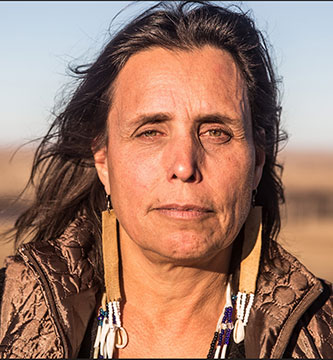
First Nations Scholar Activist, Winona LaDuke
This year’s Ethyle R. Wolfe Institute for the Humanities Robert L. Hess Scholar-in-Residence Program was postponed from the spring to fall 2020 because of the COVID-19 restrictions and the campus shutdown. Undeterred, Wolfe Institute Director Rosamond S. King and the Hess committee reorganized the program and proudly welcomed internationally known rural development economist, author, scholar, and environmental activist Winona LaDuke as this year's Hess Scholar. The weeklong series of virtual meetings and associated programming engaged a wide range of campus constituents and hundreds of students and kicked off the year's conversations around anti-racist pedagogy, indigenous studies, and sustainability.
Each year, the scholar in residence program invites a distinguished academic to the campus. The program serves as a permanent tribute to the legacy and commitment of former Brooklyn College President Robert L. Hess. Since its founding in 1993 until last year when he retired, the Hess Scholar-in-Residence Program was chaired and organized by the late Director of the Wolfe Institute Professor Robert Viscusi, a premier scholar of Italian American Studies, who passed away on January 19, 2020. Acknowledging his impact on 51 years at the nexus of intellectual life at Brooklyn College, the 2020 Robert L. Hess Scholar-in-Residence Program was dedicated to his memory.
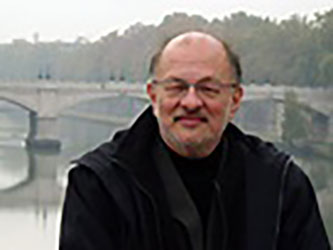
The late Robert Viscusi, director of the Ethyle R. Wolfe Institute for the Humanities, 1993–2019.
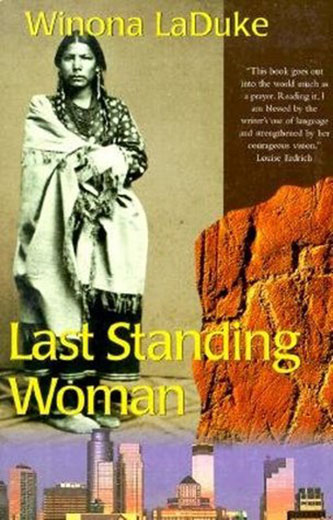
Cover from Last Standing Woman, one of LaDuke's publications.
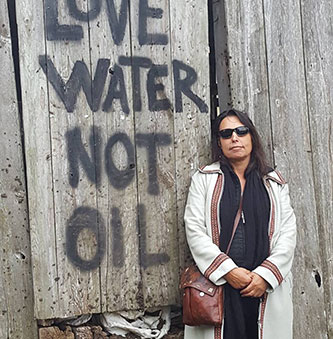
LaDuke at a protest against the oil pipeline on indigenous lands.
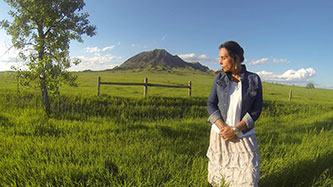
Winona LaDuke on her farm on the White Earth Reservation.
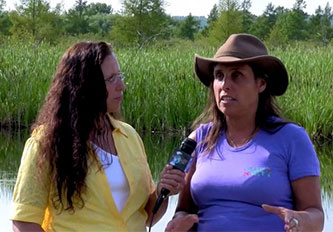
Winona LaDuke being interviewed at her rice farm in Minnesota.
Our 2020 guest scholar Winona LaDuke studies, speaks about, writes on, and practices indigenous economics, food, and energy policy. A graduate of Harvard and Antioch universities, she has written extensively on Native American and environmental issues and is the author of six books, including Recovering the Sacred, All Our Relations, Last Standing Woman, and her newest work, The Winona LaDuke Chronicles. She lives and works on the White Earth reservation in northern Minnesota, where she serves as the executive director of Honor the Earth (HtE), a platform she co-founded to raise awareness and money for Indigenous struggles for environmental justice. She works nationally and internationally on the issues of climate change, renewable energy, and environmental justice alongside Indigenous communities. She is also the founder of the White Earth Land Recovery Project, Anishinaabe Agriculture Institute, and Akiing: 8th Fire Project, and runs Winona's Hemp and Heritage Farm.
Globally and nationally, LaDuke is known as a leader in the issues of culturally based sustainable development strategies, renewable energy, and sustainable food systems. As co-founder and board co-chair of the Indigenous Women's Network for 15 years, LaDuke maintains a significant role in international advocacy for indigenous people.
LaDuke's work on food systems includes: the creation of Native Harvest, the protection of wild rice (manoomin), and the promotion of food sovereignty for reservation communities. On her farm in northern Minnesota, she grows traditional varieties of corn, beans, squash, Jerusalem artichokes, melons, herbs, and tobacco. She is one of the leaders in the work of protecting Indigenous plants and heritage foods from patenting and genetic engineering.
Being aware of her years of advocacy for indigenous cultures and the sustainability of the land, her invitation to the college was highly anticipated by many members of the campus community. Julia Steiner, a graduate student in the Department of History, described her deep appreciation for LaDuke's presence. "As someone who started having conversations about the lack of indigenous scholarship at Brooklyn College my first semester in 2011, having Winona LaDuke as the Hess scholar this year was personally profound."
Over the course of the week, numerous events allowed students and faculty to be immersed in and gain insight into the issues to which LaDuke has dedicated her life. The first event of the week took place on Monday, September 21, and was entitled "Native/Indigenous Studies, Here & Now: Conversation With Jaskiron Dhillon and Winona LaDuke." The conversation was preceded by a land acknowledgment and blessing by Indigenous Elder George Stonefish. The presentation introduced the native peoples in the New York region and indigenous studies in the 21st century to students in philosophy and history. Simply raising the consciousness of all participants to the long history and current reality of indigenous people in the land we occupy jumpstarted the awakening. Another panel discussed "The I in BIPOC: Racial Justice and Indigenous People" and engaged students from anthropology, sociology, Africana studies, and American studies.
Throughout the residency, topics included social justice, food sovereignty, decolonizing, environmental sustainability, and cultural appropriation, from numerous vantage points. On Wednesday, a panel discussion addressed "Civil Rights and Resistance: Uprisings for Planetary Justice" with anthropologist Christopher Loperena and sociocultural anthropologist Rhea Rahman, and was presented to students in classics, women and gender studies, anthropology, and history. A roundtable on "Food Sovereignty and Public Health" with Bowing to No One filmmaker Sarah K. Khan, East New York Farms! Coordinator Tiana Rainford, and Department of Health and Nutrition Sciences Professor Margrethe Horlyck-Romanovsky was presented to students in the Anthropology of Food course.
On Thursday, the "Countering Colonialism in the Classroom" panel featured Sociology Professor Lawrence Johnson in conversation with cultural anthropologist Victoria Stone-Cadena, moderated by Naomi Schiller. Another roundtable discussion, "Sustainability in the 21st Century," with sociologist Tammy L. Lewis, and director of the Science and Resilience Institute at Jamaica Bay, Brett Branco, involved students in the Sociology of the Environment course.
Later in the week, LaDuke was featured in a discussion with Nekole Parton Alligood, cultural anthropologist and member of the Delaware Nation of Oklahoma, and presented to students in several anthropology courses, including Introduction to Archeology. A focus on art and culture included a critical discussion of indigenous artifacts in museums and universities and a panel addressing how theater artists address environmental and social issues in their work organized by Laura Tesman, Department of Theater, with students from the Caribbean Literature class.
In addition to speaking to full classes, LaDuke met with groups of students in more intimate Zoom settings, including a small group of student activists, students from the Women's Center, and students in the women's and gender studies and urban sustainability programs.
The central event of the series was the Robert L. Hess Memorial Lecture, "Lighting the 8th Fire, Economics for the 7th Generation," on Friday, September 25. A special presentation of the evening was a musical selection, "Wood That Sings." by American composer and flautist Brent Michael Davids and performed by Elena Ruiz, a student in the Brooklyn College Conservatory of Music. This piece, composed for solo violin, evokes the rhythms and refrains of the single-stringed Apache violin. LaDuke introduced her lecture with a greeting in her Anishinaabe language. She explained during the Zoom event that the price for taking from the land and not giving back, and not being reverent of the earth and its creatures, is the havoc that is being wreaked today—citing the effects of extreme weather and the destruction of America's western woodlands and ecosystems by wildfires. Her talk was an impassioned call to draw on indigenous concepts and traditions to guide our path to a more just and sustainable America.
Several corollary asynchronous programs were developed across campus to engage and inform students in many disciplines, including an interactive podwalk developed by students in the urban sustainability program, an exhibit featuring the works of LaDuke and other indigenous writers, as well as a number of resources including essays, videos, assignments, and e-books related to LaDuke, which faculty and students can integrate into their classes. Supporting the Wolfe Institute's theme of LAND, this year's Robert Viscusi Faculty Reading Group, led by Professor Conor Tomás Reed, is engaging the theme "Land, Decolonization, and the University," focusing on LaDuke's book Recovering the Sacred: The Power of Naming and Claiming. These materials, as well as the recordings of the panel discussions, are available to faculty and students and can continue to position the campus to think seriously about creating anti-racist, inclusive, and life-affirming curricula in our respective disciplines and departments.
As graduate student Steiner noted, "One of the many takeaways from her week was that we must make space for indigenous voices, both physically in the student and faculty body, but also in course material and in the way we discuss and define indigeneity and colonialism. Brooklyn College is in a wonderfully unique position now to create that inclusive space for the indigenous voices and knowledge that has always been here and start building a more sustainable future."






